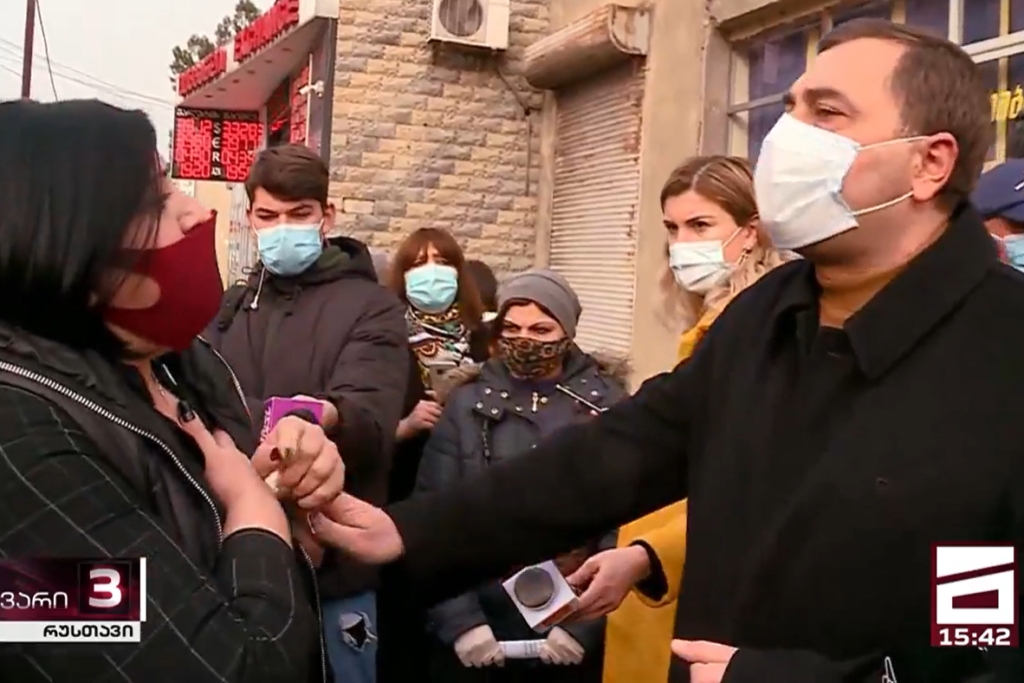Several groups have defied tight anti-coronavirus curbs the Georgian Government instituted on 28 November, including gym owners and street vendors.
Zurab Girchi Japaraidze, the Chair of the libertarian Girchi Party, said he had been summoned to the Interior Ministry on Monday after supporting Reformerfitness, a gym in Batumi that refused to close after the lockdown came into force.
The gym was originally fined ₾10,000 ($3,000) for defying rules closing gyms in major cities. The gym’s owner, Giorgi Putkaradze, vowed to continue to challenge the curbs by keeping the gym open.
[Read more on OC Media: Georgia goes into lockdown]
Japaridze rented the fitness centre on 29 November — a result of verbal agreement according to him - to be considered as his temporary housing. By doing so, the leader of Girchi hoped to use it as a loophole in regulations and invited gymgoers to his ‘home’.
This did not convince law enforcement officers, who on the night of 29 November sealed the gym. Police officers remained outside the building to prevent gymgoers from entering.
The anti-coronavirus Interagency Council claimed on 30 November that regulatory bodies had fined three and suspended 4,194 establishments since the lockdown, and that they had also cited 1 for repeated violation.
In late April, two months after registering the first coronavirus case in the country, Georgia criminalised repeat breaches of ‘sanitary-epidemiological standards’. The penalties include a ban on running their respective business or up to six years in prison for an individual.
On 30 November, the Movement for Georgia, a group affiliated with the United National Movement party, set up tents at the rear entrance of the Georgian Parliament in Tbilisi demanding that the lockdown be rescinded and new parliamentary elections held.
Protests by street vendors
On Monday, two separate groups of street vendors in the capital Tbilisi and nearby city of Rustavi defied the lockdown, which barred them from selling products.
Rustavi Mayor Irakli Tabagua visited the demonstration at the Istanbul Market in Rustavi, but left the area briefly after being confronted by several of the vendors.
The workers, who blocked the motorway nearby, warned they would resort to ‘permanent protests’ unless they were allowed to work.
A similar protest took place in central Tbilisi at an area where flower vendors gather on University Street.
Comments by the head of the Labour Inspection Department, Beka Peradze, caused anger from some after he pointed out that street vendors could continue to operate online.
The authorities banned all types of open markets nationwide except for agricultural ones, effectively barring small-time sellers who have no opportunity to sell and deliver products online.
The government plans to re-allow them and shopping centres to reopen during the holiday season, from 24 December to 2 January, and again from 16 January except on weekends.
Employees of businesses deemed essential and allowed to continue operating, such as grocery stores and pharmacies, have also raised concerns over the new restrictions. Because of a ban on public transport, many have found it difficult to get to work.
Anti-Lockdown protesters were not the only ones to hold demonstrations since the new restrictions came into force. On Monday, a group of protesters picketed the local government office in the port city of Batumi on Georgia’s Black Sea coast.
While some were demanding the government solve a water supply problem in the nearby Tsikhisdziri settlement, others, supported by several opposition groups, were demanding the resignation of the local government, including the head of the Autonomous Republic of Adjara, Tornike Rizhvadze, citing ‘rigged’ elections. The demonstration resulted in an altercation with police.
The elections on 31 October have been disputed by all eight opposition parties that won seats in parliament. They have vowed to boycott parliament unless repeate elections are held. Negotiations between them and the ruling Georgian Dream party, brokered by Western diplomats in Tbilisi, are still ongoing.
On 28 November, two activists were fined outside Parliament after protesting what the Russian Foreign Ministry described as a ‘mutual understanding’ between Russian and Georgian diplomats over an ‘anti-Russian provocation’ by ‘Georgian nationalists’ in June last summer. The activists were injured during their detention.
The Georgian Foreign Minister denied there was any discussion of last year’s rally during recent talks with the Russians, and also distanced themselves from the Russian ministry’s press-release.




 30 November 2020
30 November 2020



